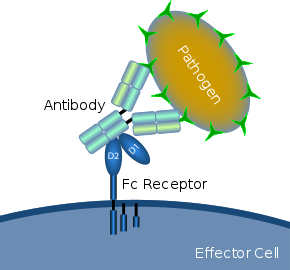Immune receptor
An immune receptor (or immunologic receptor) is a receptor, usually on a cell membrane, which binds to a substance (for example, a cytokine) and causes a response in the immune system.

example of Immune receptor
Types
The main receptors in the immune system are pattern recognition receptors (PRRs), Toll-like receptors (TLRs), killer activated and killer inhibitor receptors (KARs and KIRs), complement receptors, Fc receptors, B cell receptors and T cell receptors.[1]
| Receptor | Bind to [1] | Function[1] |
|---|---|---|
| pattern recognition receptors (PRRs) (e.g. TLRs, NLRs) |
pathogen-associated molecular patterns (PAMP) | Mediate cytokine production --> inflammation --> destroying pathogen |
| killer activated and killer inhibitor receptors (KARs and KIRs) | Avails NK cells to identify abnormal host cells (KAR) or inhibit inappropriate host cell destruction (KIR) | |
| complement receptors | complement proteins on e.g. microbes | Allow phagocytic and B cells to recognize microbes and immune complexes |
| Fc receptors | epitope-antibody complexes | Stimulate phagocytosis |
| B cell receptors | epitopes | B cell differentiation into plasma cells and proliferation |
| T cell receptors | linear epitopes bound to MHC | Activate T cells |
| Cytokine receptors | cytokines | regulation and co-ordination of immune responses |
See also
References
- Lippincott's Illustrated Reviews: Immunology. Paperback: 384 pages. Publisher: Lippincott Williams & Wilkins; (July 1, 2007). Language: English. ISBN 0-7817-9543-5. ISBN 978-0-7817-9543-2. Page 20
External links
- immunologic+receptor at the US National Library of Medicine Medical Subject Headings (MeSH)
This article is issued from
Wikipedia.
The text is licensed under Creative
Commons - Attribution - Sharealike.
Additional terms may apply for the media files.